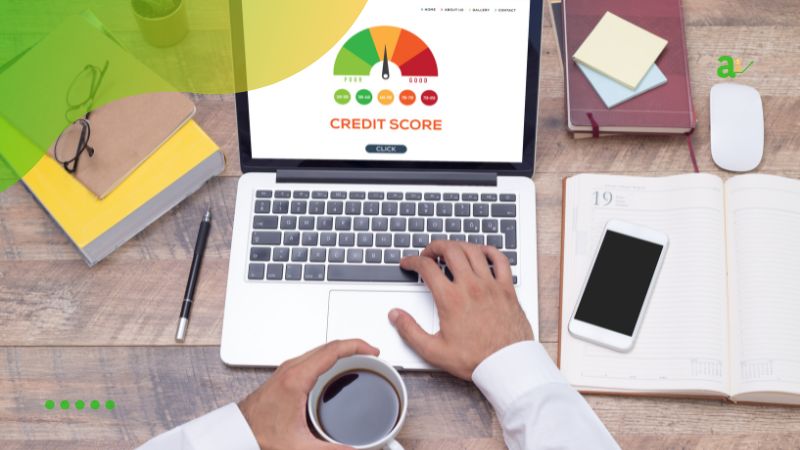Improve your credit score fast by understanding the significance of maintaining a high credit score and how it impacts your financial life. A good credit score is more than just a number; it’s a reflection of your creditworthiness and financial responsibility.
Lenders, landlords, and even some employers use your credit score to gauge your reliability. Therefore, taking steps to improve it can lead to numerous benefits, such as lower interest rates on loans, higher chances of credit approval, and better terms for various financial products.
Improving your credit score might seem daunting, but with the right strategies, you can see positive changes relatively quickly. This comprehensive guide will provide you with actionable steps, from checking your credit report for errors to making timely payments and reducing your debt. By following these guidelines, you can improve your credit score fast and secure a more stable financial future.
In the sections that follow, we’ll delve into specific methods to enhance your credit score, monitor your progress, and avoid common pitfalls. Whether you’re aiming to buy a house, finance a car, or simply improve your financial health, this guide will equip you with the knowledge and tools to achieve your goals efficiently. Let’s embark on this journey to better credit together.
Understanding Credit Scores
Before we discuss ways to improve your credit score fast, it’s important to understand what a credit score is. Essentially, your credit score is a numerical representation of your creditworthiness, ranging from 300 to 850. This score is calculated based on several factors, including your credit history, payment history, credit utilization, and other relevant information.
To begin with, a credit score reflects your financial behavior and history with credit. It helps lenders assess the risk of lending you money or extending credit. The higher your score, the more likely you are to be approved for loans and credit lines with favorable terms.
Next, let’s break down how your credit score is calculated. There are five main components:
- Payment History (35%): Your track record of making on-time payments.
- Credit Utilization (30%): The ratio of your current credit card balances to your credit limits.
- Length of Credit History (15%): The age of your oldest account, newest account, and the average age of all your accounts.
- New Credit (10%): The number of recently opened accounts and hard inquiries.
Why Your Credit Score Matters
Moreover, understanding the importance of a good credit score can motivate you to take steps to improve it. For instance, a higher credit score can unlock numerous financial opportunities, including:
- Lower Interest Rates: With a good credit score, you can qualify for lower interest rates on loans and credit cards, saving you money over time.
- Increased Loan Approval Chances: Lenders are more likely to approve your loan applications if you have a high credit score.
- Better Terms for Insurance Policies: Some insurance companies use credit scores to determine your premium rates, meaning a better score could result in lower costs.
- Higher Credit Limits: A strong credit score can also lead to higher credit limits, giving you more financial flexibility.
Furthermore, it’s crucial to know the factors that influence your credit score. While payment history and credit utilization are the most significant, other factors such as the length of your credit history, the types of credit you have, and recent credit inquiries also play a role. Understanding these elements can help you identify areas where you need to focus your efforts to improve your credit score fast.
By recognizing the components and significance of your credit score, you can better navigate the financial landscape and make informed decisions. In the next section, we will delve into practical steps you can take to quickly enhance your credit score.
Steps to Improve Your Credit Score Fast
Now that we understand the importance of a good credit score, let’s explore actionable steps to boost it quickly. By following these steps, you can improve your credit score fast and unlock better financial opportunities.
1. Check Your Credit Report for Errors
First and foremost, obtain a copy of your credit report from the three major credit bureaus: Equifax, Experian, and TransUnion. Carefully review each report for errors, such as incorrect personal information, accounts that don’t belong to you, and inaccurate late payments. If you find any discrepancies, dispute them immediately. Correcting errors on your credit report can quickly boost your score.
2. Pay Down Balances
Next, focus on reducing your outstanding balances. Aim to pay down high-interest credit cards first, as they can significantly impact your credit utilization ratio. Lowering your credit utilization to below 30% of your total credit limit can positively influence your score. Additionally, consider making more than the minimum payment each month to reduce your balances faster.
3. Make Timely Payments
Furthermore, ensuring that all your bills are paid on time is crucial. Late payments can remain on your credit report for up to seven years, so consistency is key. Moreover, catching up on any past-due accounts can help improve your payment history.
4. Avoid Opening New Credit Accounts
Although it may appear counterintuitive, opening new credit accounts can temporarily lower your credit score. Each new account leads to a hard inquiry, which can negatively affect your score. Instead, concentrate on responsibly managing your current accounts. Additionally, avoid closing old accounts, as this can reduce the length of your overall credit history and negatively impact your score.
5. Become an Authorized User
An effective method to boost your credit score is by becoming an authorized user on another person’s credit card. Ensure that the primary account holder has a solid credit history, as their positive payment behavior will appear on your credit report. This approach is especially useful if you have a limited credit history.
6. Diversify Your Credit Mix
Having a mix of different types of credit accounts can positively influence your credit score. This includes credit cards, installment loans, and retail accounts. However, avoid taking on new debt solely to diversify. Instead, focus on efficiently managing the credit accounts you currently have.
7. Keep Credit Card Balances Low
Keeping your credit card balances low relative to your credit limits is crucial. Aim to keep your balances below 30% of your credit limits, but striving for even lower ratios can have an even greater positive effect on your credit score.
8. Use a Secured Credit Card
If you have a poor credit history or no credit history at all, using a secured credit card can help you build credit. A secured credit card requires a cash deposit, which acts as your credit limit. By using the card responsibly and making timely payments, you can gradually build or rebuild your credit.
9. Negotiate with Creditors
If you’re dealing with high balances or past-due accounts, negotiating with your creditors can be beneficial. They might be willing to offer a payment plan, settle for a lower amount, or even remove negative information from your credit report in exchange for payment. Negotiating with creditors can provide immediate relief and positively affect your credit score.

Frequently Asked Questions (FAQ)
1. How can I improve my credit score fast?
To improve your credit score quickly, start by checking your credit report for errors and disputing any inaccuracies. Pay down high-interest balances, make timely payments, and avoid opening new credit accounts. Additionally, consider becoming an authorized user on a responsible account and maintaining low credit card balances.
2. How long does it take to see improvements in my credit score?
The time it takes to see improvements in your credit score depends on your individual circumstances. Generally, you can start seeing positive changes within a few months if you follow the correct steps, such as paying down balances and making timely payments.
3. Will paying off all my debt immediately improve my credit score fast?
Paying off debt can significantly improve your credit score, particularly if it reduces your credit utilization ratio. However, the impact may vary based on other factors, such as your payment history and the length of your credit history.
4. How often should I check my credit report?
However, if you are actively working to improve your credit score quickly, consider checking it more frequently to monitor your progress and catch any errors early.
5. Does becoming an authorized user help improve my credit score fast?
Yes, becoming an authorized user on someone else’s credit card can help improve your credit score fast, provided that the primary account holder has a good credit history. Their positive payment behavior will reflect on your credit report, potentially boosting your score.
6. What should I do if I find errors on my credit report?
If you find errors on your credit report, dispute them immediately with the credit bureau that issued the report. Provide any supporting documentation to prove the error and request that it be corrected. Removing inaccuracies can quickly boost your credit score.
7. How does credit utilization affect my credit score?
Credit utilization, which is the ratio of your current credit card balances to your credit limits, accounts for 30% of your credit score. Keeping your credit utilization below 30% is recommended to maintain a healthy credit score. Lowering this ratio can improve your credit score fast.
8. Is it better to pay off credit cards in full or keep a small balance?
It’s better to pay off your credit cards in full each month. Carrying a small balance does not improve your credit score and can lead to unnecessary interest charges. Paying in full demonstrates responsible credit management, which positively impacts your score.
9. Can opening new credit accounts hurt my credit score?
Yes, opening new credit accounts can temporarily lower your credit score due to hard inquiries and the impact on your average account age. Focus on managing existing accounts responsibly rather than opening new ones to improve your score quickly.
10. How can I use financial tools to help improve my credit score fast?
Several online platforms offer financial tools that provide personalized tips, credit score simulators, and access to your credit report. Using these tools can help you track your progress, identify areas for improvement, and make informed decisions to improve your credit score fast.
Conclusion
In conclusion, improving your credit score quickly is achievable with the right strategies and consistent effort. By following the steps outlined in this guide, you can take control of your financial future and improve your credit score fast. Paying down balances and making timely payments are crucial actions that will positively impact your score. Additionally, avoid opening new credit accounts and consider becoming an authorized user on a responsible account to boost your credit.
Monitoring your progress is essential, so use free credit monitoring tools to track changes in your score and stay informed about potential issues. Leveraging financial tools such as credit score simulators, budgeting apps, and debt payoff calculators can provide personalized tips and make your journey to a better credit score more manageable.
Avoid common mistakes like closing old credit accounts or applying for multiple credit cards at once. Instead, focus on maintaining a healthy credit utilization ratio and managing your existing accounts responsibly. Remember, a higher credit score opens doors to better financial opportunities and stability.
Furthermore, if you’re struggling with high balances or past-due accounts, don’t hesitate to negotiate with your creditors. Propose settlements, request payment plans, and ask for lower interest rates to make your debts more manageable. Obtaining written agreements and following through on your commitments will reflect positively on your credit report and help you improve your credit score fast.





